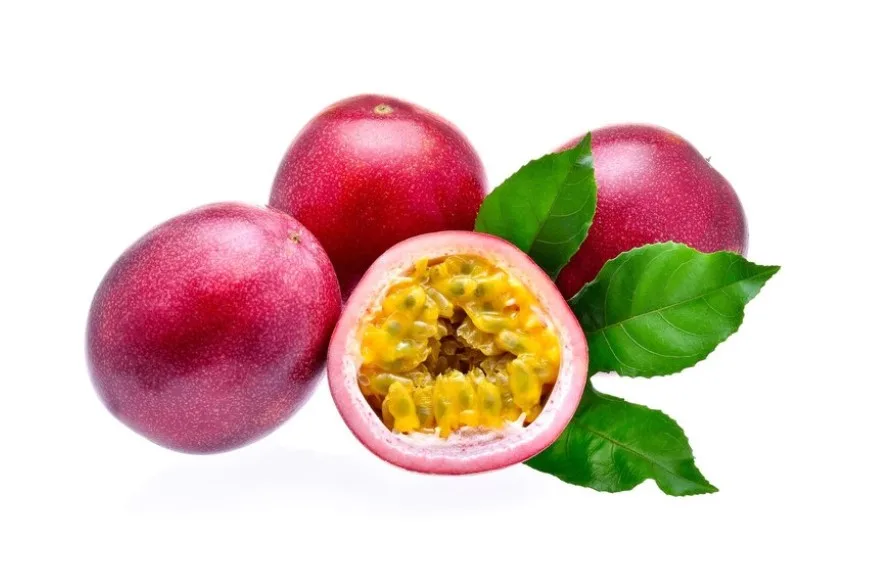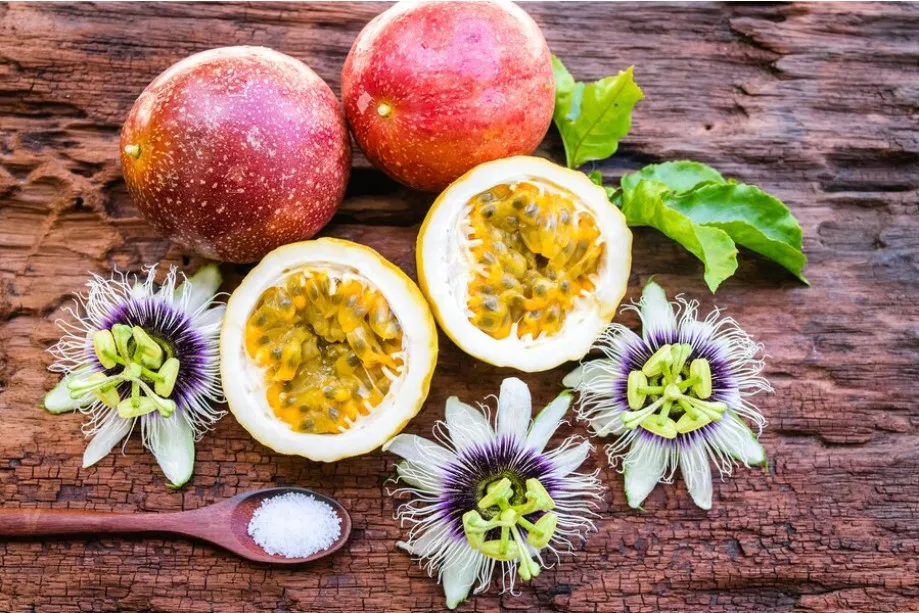Passion fruit, a tropical delight known for its vibrant flavor and numerous health benefits, has gained popularity worldwide. This article delves into the myriad health benefits and diverse uses of this exotic fruit, highlighting why it should be a staple in your diet.
Nutritional Profile of Passion Fruit
Passion fruit is packed with essential nutrients. A single serving (approximately 18 grams) contains:
- Calories: 17
- Carbohydrates: 4.2 grams
- Fiber: 2 grams
- Vitamin C: 5% of the Daily Value (DV)
- Vitamin A: 8% of the DV
- Iron: 2% of the DV
- Potassium: 2% of the DV
This nutrient-rich profile makes passion fruit an excellent choice for boosting overall health.

Health Benefits of Passion Fruit
1. Rich in Antioxidants
Passion fruit is loaded with antioxidants such as vitamin C, carotenoids, and polyphenols. These compounds play a critical role in neutralizing free radicals, thus protecting the body against chronic diseases and reducing inflammation.
2. Supports Heart Health
The high fiber content in passion fruit aids in lowering cholesterol levels, thereby promoting cardiovascular health. Additionally, the potassium in the fruit helps regulate blood pressure, reducing the risk of heart disease.
3. Enhances Digestive Health
The dietary fiber in passion fruit supports healthy digestion by promoting regular bowel movements and preventing constipation. It also fosters a healthy gut microbiome, essential for overall digestive health.
4. Boosts Immune System
Vitamin C is a potent immune booster, and passion fruit provides a substantial amount of this vitamin. Regular consumption can help fortify the immune system, making the body more resilient to infections and illnesses.
5. Improves Skin Health
The antioxidants and vitamins in passion fruit contribute to healthier skin. Vitamin A and C promote collagen production, which helps maintain skin elasticity and reduces the appearance of wrinkles.
6. Supports Eye Health
Rich in vitamin A, passion fruit is beneficial for eye health. Vitamin A helps protect the cornea and reduces the risk of age-related macular degeneration and cataracts.
7. Aids Weight Loss
Low in calories and high in fiber, passion fruit is an excellent choice for those looking to lose weight. The fiber content keeps you feeling full longer, reducing overall calorie intake.

Uses of Passion Fruit
1. Culinary Delights
Passion fruit is incredibly versatile in the kitchen. Its unique flavor can enhance a variety of dishes:
- Juices and Smoothies: The pulp can be blended into refreshing juices and smoothies.
- Desserts: Passion fruit is a popular ingredient in desserts such as cheesecakes, sorbets, and tarts.
- Salads: The tangy pulp can be used to add a tropical twist to fruit and green salads.
- Sauces and Dressings: It can be incorporated into sauces and dressings for a burst of flavor.
2. Herbal Teas
Dried passion fruit leaves are used to make herbal teas, which are known for their calming effects. This tea can help alleviate anxiety and promote better sleep.
3. Natural Remedies
In traditional medicine, various parts of the passion fruit plant are used for their therapeutic properties. The leaves and flowers are known for their sedative and anti-spasmodic effects, making them useful in treating conditions such as insomnia and muscle spasms.
4. Skincare Products
Given its antioxidant properties, passion fruit extract is often used in skincare products. These products help in moisturizing the skin, reducing inflammation, and combating signs of aging.

How to Select and Store Passion Fruit
Selecting Passion Fruit
When choosing passion fruit, look for fruits that are heavy for their size and have wrinkled, slightly dimpled skin. A fragrant aroma indicates ripeness.
Storing Passion Fruit
Passion fruit can be stored at room temperature until it ripens. Once ripe, it can be refrigerated for up to a week. The pulp can also be frozen for extended use.
Incorporating Passion Fruit into Your Diet
To reap the maximum benefits of passion fruit, consider the following tips:
- Breakfast Boost: Add passion fruit pulp to your morning yogurt or oatmeal for a nutritious start to your day.
- Snack Time: Enjoy fresh passion fruit as a snack. Simply cut it in half and scoop out the pulp with a spoon.
- Cooking: Use passion fruit juice or pulp in marinades and dressings to add a unique flavor to your dishes.
- Baking: Incorporate passion fruit into your baking recipes, such as cakes and muffins, for a tropical twist.
Potential Allergies and Side Effects
While passion fruit is generally safe for most people, some may experience allergic reactions. Symptoms can include itching, swelling, and respiratory issues. If you suspect an allergy, it’s advisable to consult a healthcare professional.
Conclusion
Passion fruit is more than just a delicious tropical fruit; it’s a powerhouse of nutrition and health benefits. From boosting heart health and enhancing digestion to improving skin and eye health, the advantages are plentiful. Its versatility in culinary applications and use in natural remedies further underscores its value. By incorporating passion fruit into your diet, you can enjoy its exotic flavor while promoting your overall well-being.
Topics covered
- What is Passion fruit?
- What are key nutrients in Passion fruit?
- What is nutritional profile of Passion fruit?
- What are health benefits of Passion fruit?
- What are uses of Passion fruit?
- How to use Passion fruit?
- How to store Passion fruit?
- What are side effects of Passion fruit?








1 thought on “Passion Fruit: The Tropical Powerhouse for Health & Flavor”